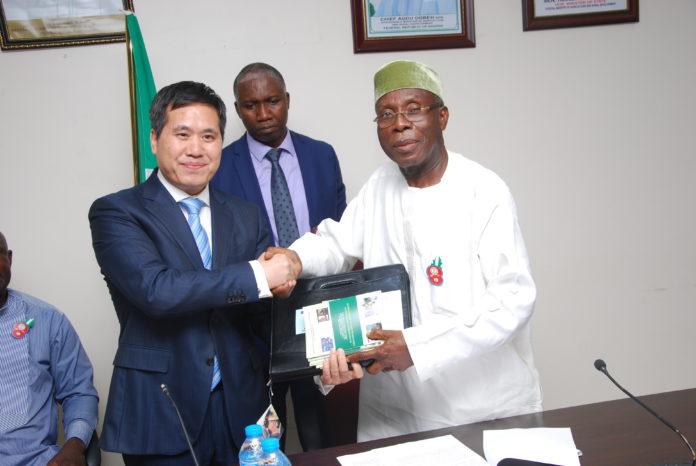
The Peoples’ Republic of China, through her embassy in Nigeria, has donated Mycotoxin handbooks to Nigeria to assist the country in her efforts to achieve food safety.
Receiving the handbooks from the Ambassador of the Peoples’ Republic of China in his office on Wednesday, 7th December, 2016, Minister of Agriculture and Rural Development, Chief Audu Ogbeh noted that there has been a lot of slow self-poisoning going on in Nigeria for many years, as we do not have enough information and education on what we eat. He thus stated that the book will help to avert the dangers inherent in the food we eat in the country and promote export of Nigeria’s food and agricultural products.
He described the handbook as a very vital publication, which should be used for massive education and training of farmers, extension workers/agents, food vendors, processors, consumers, market men and women, as well as agricultural value chain actors to propagate the message and information in the handbook.
The Minister directed that copies of the handbook should also be made available to all agricultural institutions and other relevant stakeholders in the country to help spread the message in the handbook, adding that, “It is better to prevent the ailment than to cure it.” He thanked the Peoples’ Republic of China, the embassy of China in Nigeria, the authors of the handbook and all those who contributed to putting the handbook together.
In his welcome address at the handover ceremony, Permanent Secretary of the Ministry, Dr. Shehu Ahmed, who was represented by Dr. Gidado Mohammed, informed that detection of mycotoxin in agricultural commodities usually leads to rejection, destruction and wastage, which inherently leads to reduced income, loss of foreign exchange earnings and poor image of the country.
He urged all relevant Government agencies, non-governmental organizations, development partners and other agricultural and food value chain actors to emulate the kind gesture of the Peoples’ Republic of China, so that the book can reach numerous actors in the agricultural and food value chains, with a view to mitigate the mycotoxin menace.
While presenting the handbooks to the Minister, Ambassador of the Peoples’ Republic of China in Nigeria, Dr. Zhou Pingjian informed that China stands ready to continue cooperation with the Nigerian Government and people to implement the outcome of President Buhari’s visit to China earlier this year. He added that the production/donation of the handbooks is one of the steps towards assisting Nigeria to achieve her food safety objectives.
The handbook, according to the Coordinating Director, Nigeria Agricultural Quarantine Service, Dr. Vincent Isegbe, addresses simple ways of identifying and understanding mycotoxin as they affect human lives on daily basis. The book is also intended to protect human and animal health, enhance agricultural development, facilitate trade and overall improved human and animal health, reduced economic losses and enhance national economic growth and prosperity.
The educational handbook was written by Dr. Maimuna Habib of the Nigeria Agricultural Quarantine Service and Dr. Anthony Negedu of the Raw Materials Research and Development Council, both in Abuja.
Mycotoxins are poisonous chemical substances produced naturally by certain strains of some fungal species growing on agricultural and agro-allied commodities, which have been shown to be the number one threat among food contaminants.
Goodwill messages were received from the European Union and FACAN at the handover ceremony. Also in attendance were representatives of the Minister of Environment, Director-General (NAFDAC), FAO, UNIDO, USAID, IFAD, FACA and the Market Women Association.





